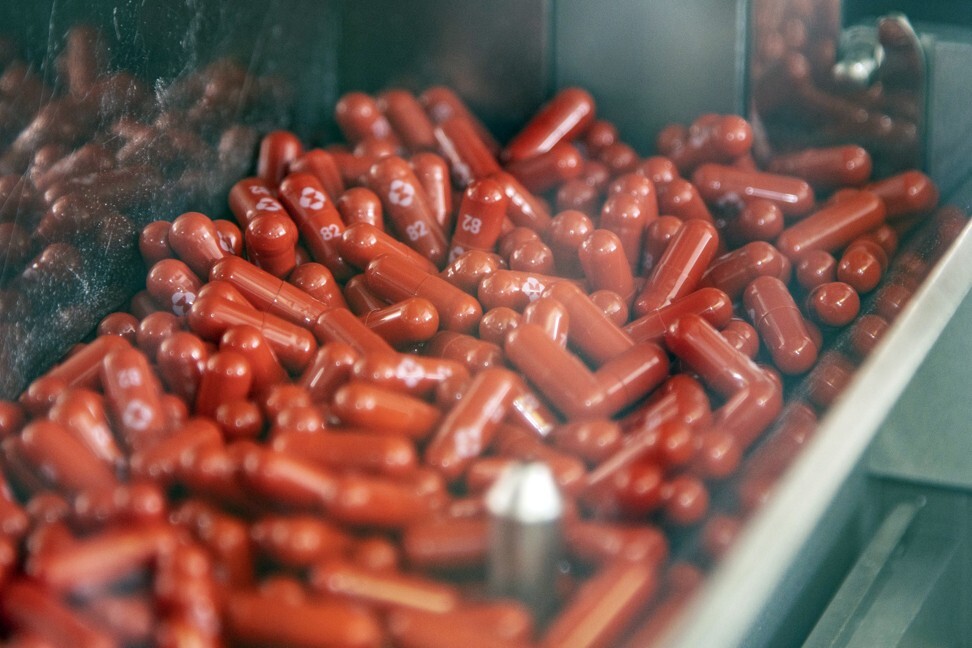
Coronavirus: Singapore reviews Covid-19 rules; Malaysia in talks to buy Merck’s experimental pills
- Singapore is reviewing its Covid-19 protocols amid growing calls by some doctors to shelve the city state’s aggressive testing regime
- Elsewhere, some 10,000 people are expected to attend a sports event in Indonesia, while Malaysia is eyeing a deal to buy Merck’s antiviral pill
Singapore on Saturday said it was reviewing its Covid-19 protocols, including the testing of asymptomatic patients, amid growing calls by some doctors to shelve the city state’s aggressive testing regime.
“As far as our protocols are concerned, we have lightened up,” said Kenneth Mak, the health ministry’s director of medical services.
For example, he said individuals who tested positive at home with antigen rapid-test kits would not need to be hospitalised. They would only need to self-isolate and could resume their normal activities if they tested negative after three days.
But more caution was needed for residents who were in close contact with vulnerable persons, like those in nursing homes or hospitals, he said. These individuals would be required to take a polymerase chain reaction (PCR) test.
“We are looking to simplify our protocols, simplify the processes, and we will relook even in these cases, whether there is value to continue with PCR testing,” Mak told reporters.
The remarks came as experts and the opposition in recent days urged authorities to drop the city state’s aggressive testing programme. They suggested that mild positive cases could flood hospitals, draining resources that should be conserved for severe cases.
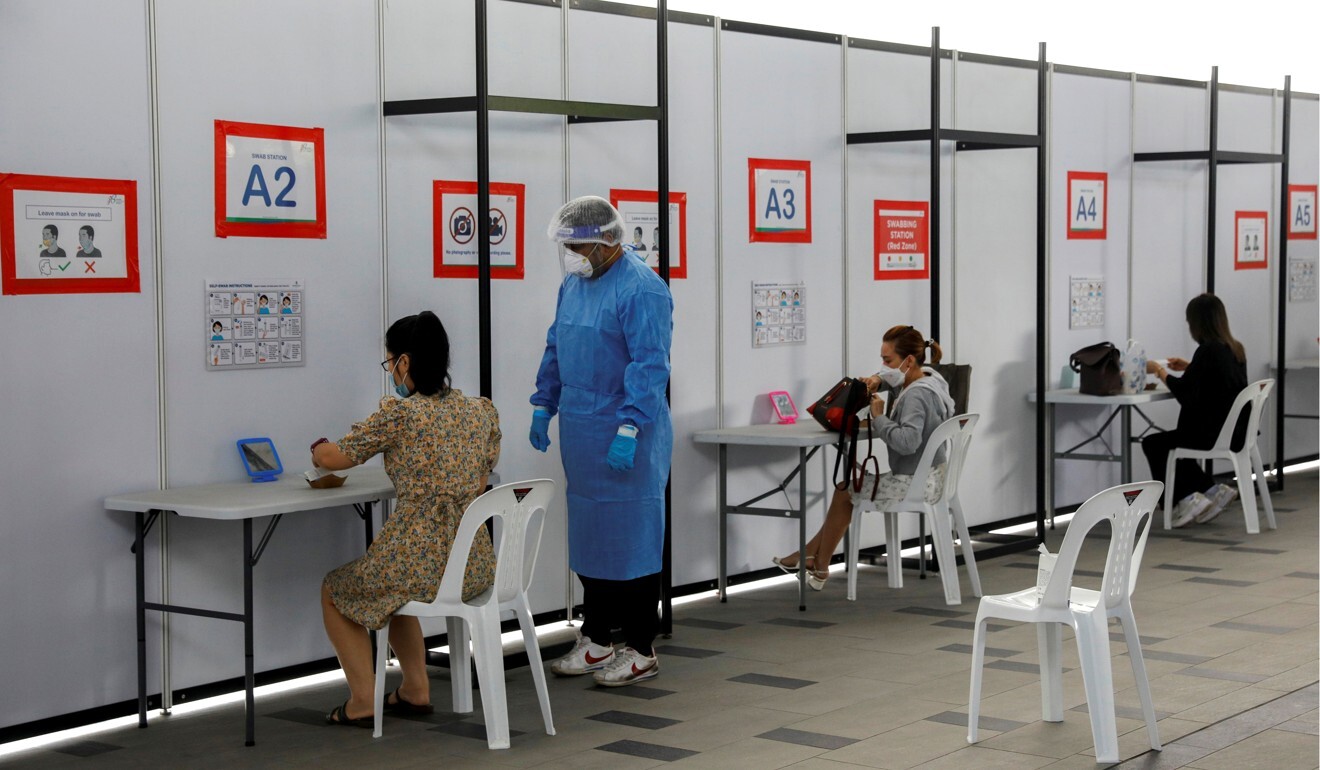
Singapore is grappling with its worst outbreak yet, with 2,356 infections reported on Saturday. The death toll stood at 107, mostly made up of unvaccinated seniors.
The country boasts one of the highest vaccination rates in the world, with 82 per cent of its population fully inoculated, but health minister Ong Ye Kung on Saturday stressed that the unvaccinated and elderly remained vulnerable. Unvaccinated people were 14 times more likely to require intensive care or die, he said.
As a large part of its population has been vaccinated, Singapore has recently allowed more people to recover from home to relieve the burden on its already-taxed health care system.
Home recovery is the default for patients aged 69 or below who have been fully vaccinated, do not have any serious illnesses and are not living with anyone older than 80. Some 56 per cent of Singapore’s cases are now recovering from home.
Ong said that there had been “teething issues” that residents under the programme had faced, but resources had since been strengthened, including improvements to its telemedicine services.
“The situation for the home recovery programme has improved,” said Ong, who added that the country’s military was now running the operations of the scheme.
The ministry was looking to scale up the programme in anticipation of a further surge in cases, said Ong. Authorities expect daily cases to surpass the 5,000 mark next week.
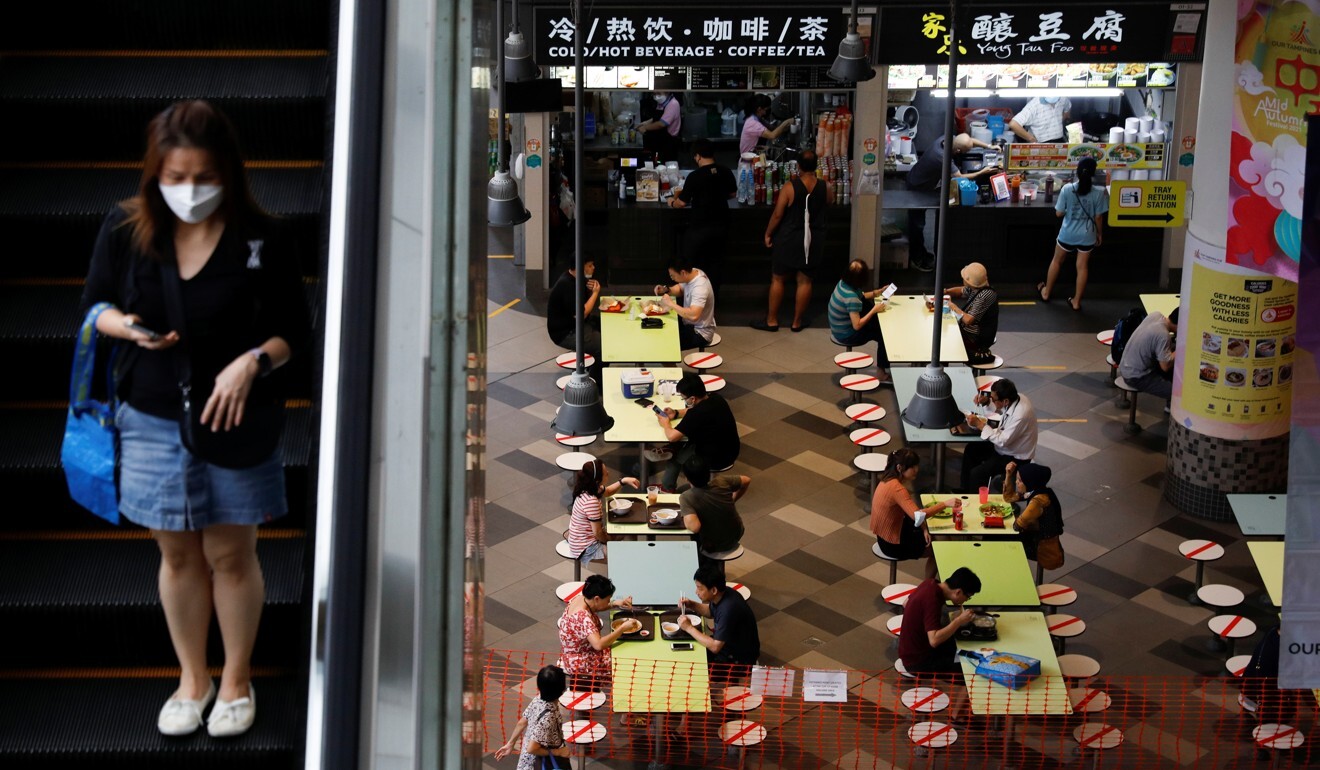
A high caseload is not particularly worrying given Singapore’s high vaccination rate, but officials fear it could translate into high hospitalisation numbers and overwhelm the health system.
Of more than 31,000 people infected in the past month, about 98 per cent had no or mild symptoms. Some 1.5 per cent required additional oxygen and 0.2 per cent were severely ill. Ong said that for vaccinated people, Covid-19 had become a “mild disease”.
Authorities have maintained they would not make vaccination mandatory for the elderly. Mak noted that the vaccines currently used in Singapore’s vaccination campaign – Pfizer-BioNTech and Moderna – were only provisionally approved by local drug regulators and had not been granted full approval.
Meanwhile, the quarantine period for travellers entering Singapore will be eased next week.
Visitors from certain regions will from October 7 need to spend 10 days in isolation, instead of 14 days currently, officials said.
The new quarantine rules apply to so-called Category 3 countries, which will include the US and Britain from next week.
As part of the changes announced on Saturday, Singapore also plans to move several countries to Category 2, from where travellers only need to spend seven days in quarantine, starting October 7.
Those being moved to that group include France, Spain, the Netherlands and Sweden. At the same time, countries including Ireland and Greece will be moved to Category 3.
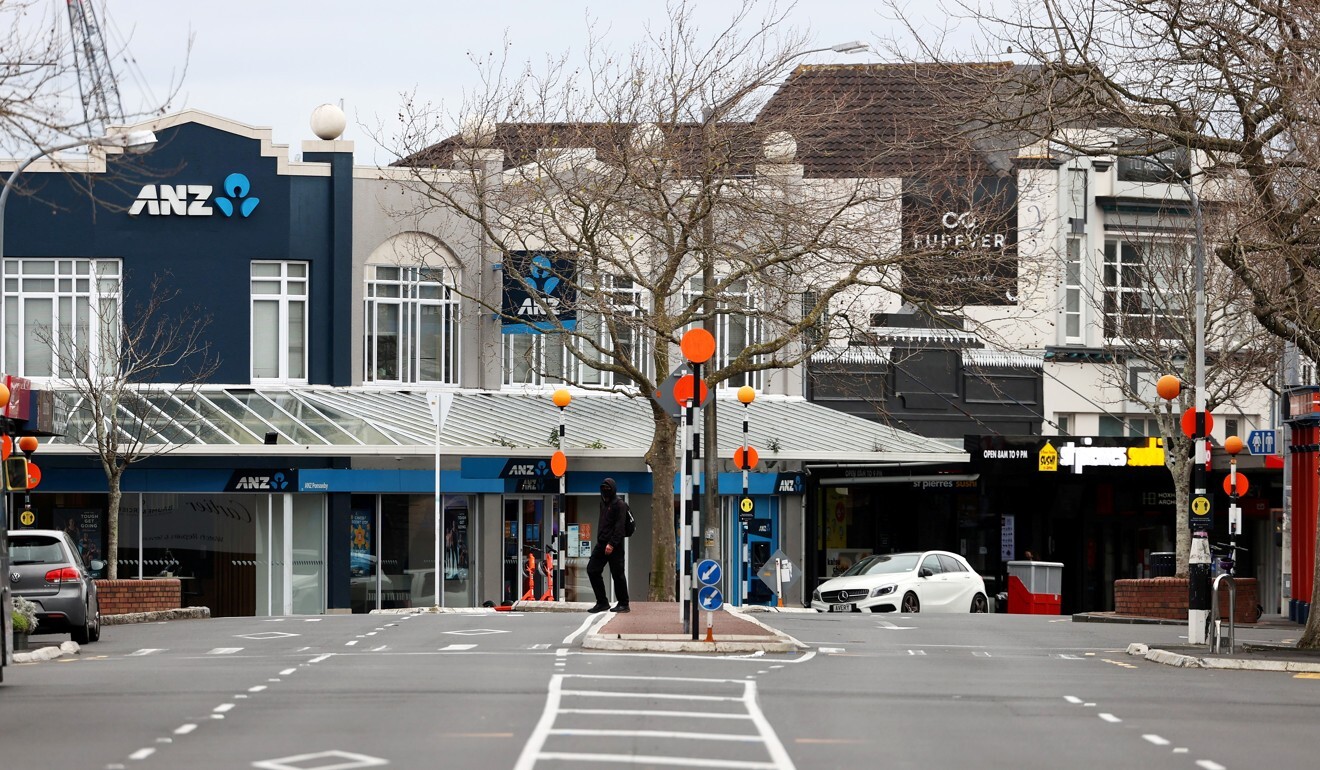
New Zealand church followers protest lockdown
New Zealand officials reported 27 new Covid-19 Delta cases in Auckland on Saturday as protesters gathered to rally against an almost two-month lockdown in the country’s biggest city.
Auckland’s 1.7 million residents are expecting a government decision on Monday about whether it will remain sealed off from the rest of New Zealand.
Daily case numbers have fluctuated between 8 and 45 in recent days, with the total from the outbreak in the city standing at 1,295 cases.
The Health Ministry said the fluctuation was expected “at this state in the outbreak”.
Prime Minister Jacinda Ardern enforced what was meant to be a “short and sharp” nationwide lockdown in mid-August in response to the Auckland outbreak. But while the rest of the country has largely returned to normal life, the city has remained in lockdown for about seven weeks.
Around 1,000 people in the protest, organised by Destiny Church, a Pentecostal fundamentalist Christian movement, demanded “freedom from lockdown”, New Zealand media reported. There were no immediate reports of violence or arrests.
Rallies were expected to also take place in the capital Wellington and Christchurch.
While New Zealand was among just a handful of countries to bring Covid-19 cases down to zero last year and largely stayed virus-free until the latest outbreak in August, difficulties in quashing the Delta variant have put Ardern’s elimination strategy in question.
Amid mounting pressure, Ardern has said her strategy was never to have zero cases, but to aggressively stamp out the virus. She said strict lockdowns can end if 90 per cent of the eligible population is fully vaccinated, contrasting with the current 46 per cent.
Malaysia in talks to procure Merck’s Covid-19 pills
Malaysia is in talks to procure an experimental antiviral pill developed by Merck & Co for Covid-19 treatment, the health minister said on Saturday.
Health Minister Khairy Jamaluddin said in a tweet that he had started negotiations to procure the new drugs, referring to a report on Friday that the pill developed by Merck could halve the chances of hospitalisation or death for those most at risk of contracting severe Covid-19.
“As we transition to living with Covid, we will be adding new, innovative treatment options to our arsenal in addition to vaccines,” Khairy said.
Merck and partner Ridgeback Biotherapeutics are planning to seek US emergency use authorisation for the pill as soon as possible and to make regulatory applications globally.
The pill molnupiravir, designed to introduce errors into the genetic code of the virus, would be the first oral antiviral medication for Covid-19.
Current treatment options include Gilead Sciences Inc’s infused antiviral remdesivir and generic steroid dexamethasone, both of which are generally only given once a patient has already been hospitalised.
There was not immediate response to a request to clarify if the ministry’s negotiations also included Gilead Sciences or Pfizer which is developing an antiviral pill with Swiss drug maker Roche Holding AG.
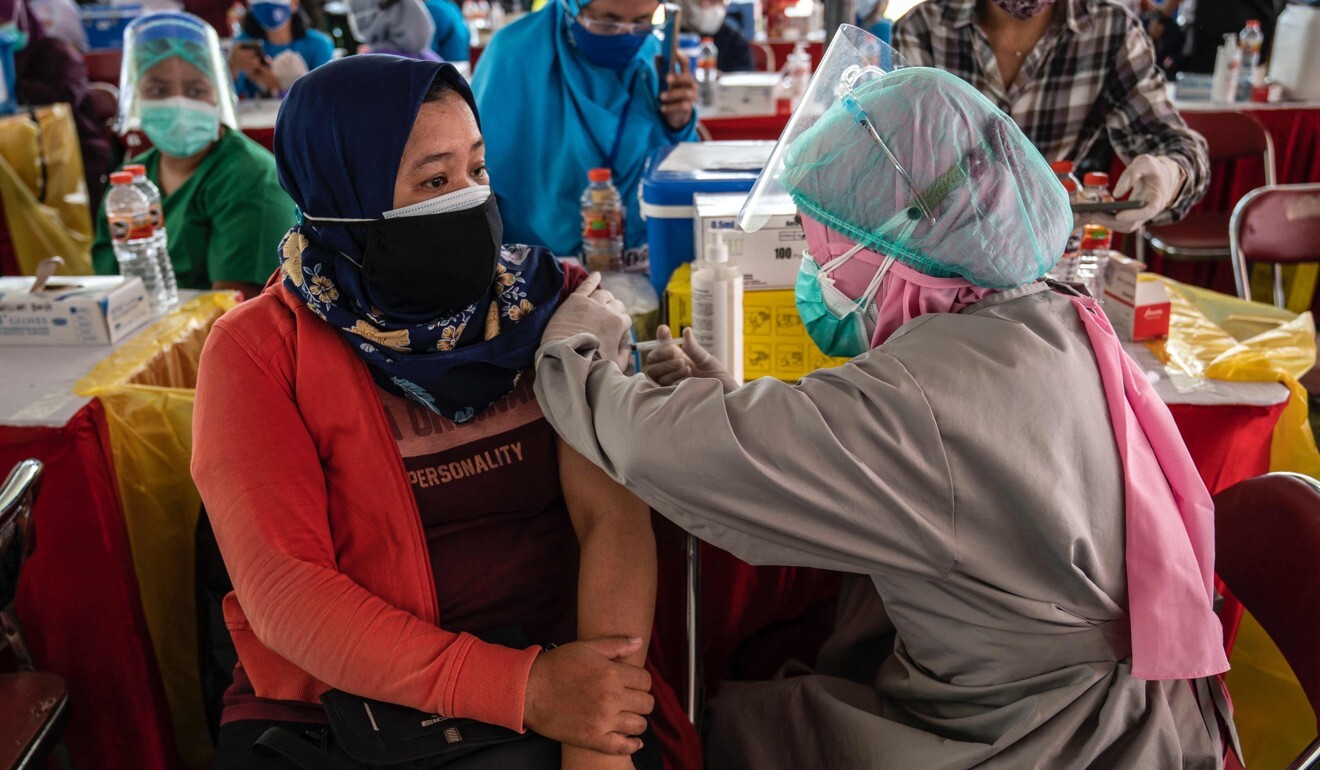
Indonesia opens big sport event
As many as 10,000 people attended the opening ceremony of Indonesia’s first major sports event since its worst Covid-19 outbreak – a test of its strategy of living with the virus.
The national sporting week called PON started on Saturday at a newly renovated stadium in the eastern city of Jayapura, with the number of spectators meeting the 25 per cent maximum capacity set by the domestic affairs ministry.
Spectators have to be tested before entering the venue, wear masks and maintain social distancing, according to the ministry.
Normal activities are starting to return in Southeast Asia’s biggest economy as its coronavirus cases and deaths are brought under control. That’s a stark contrast to just a month ago, when the country was reporting the world’s highest number of coronavirus deaths each day. The country added 1,414 cases on Saturday and 89 deaths from the virus.
Now, the government is seeking to rely on a combination of testing, health protocols and vaccination to keep any new resurgence of cases under control.
Large-scale public events like PON will put that plan to the test at a time when vaccination coverage is still low. Less than 20 per cent of Indonesians are fully inoculated. In Papua province, where the sporting event is being held, just 11 per cent of people have gotten both shots.
Australia records 2,357 new cases
An 18-month ban on international travel is set to be gradually lifted from next month for some states when 80 per cent of people aged 16 and over are fully vaccinated.
Fifty-five per cent of Australians were fully inoculated as of October 1, but nearly 80 per cent have received at least one shot.
The state, where about a quarter of Australia’s population of 25 million live, has been in a hard lockdown since August 5.
New South Wales (NSW) state, battling the country’s biggest Delta outbreak, reported 813 cases and 10 deaths on Saturday. Nearly 88 per cent of the state’s eligible population have been partially vaccinated and 65 per cent fully.
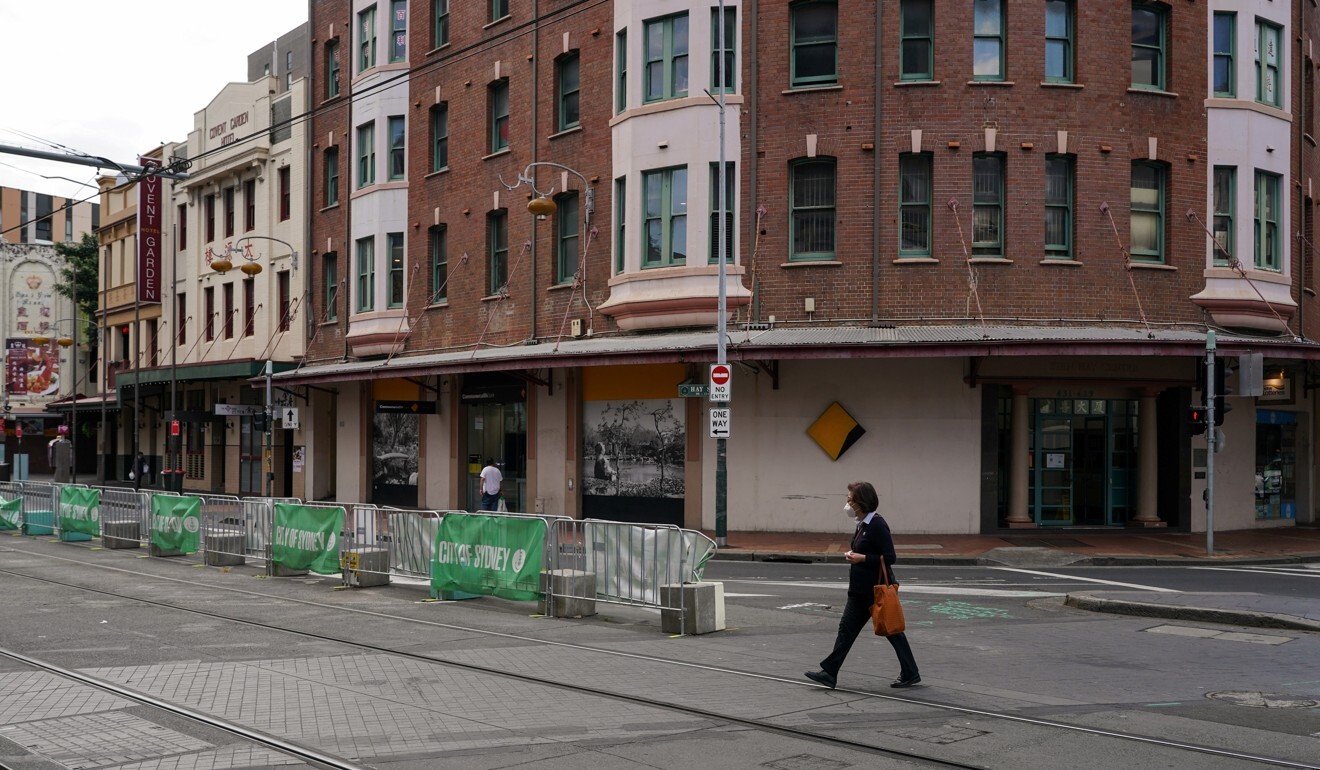
Sydney, the NSW state capital, has been under lockdown since June 26, with some restrictions scheduled to be lifted on October 11 and more later in the month.
NSW is expected to be the first state to fully open up once the 80 per cent vaccination is reached, but authorities have warned case numbers are expected to soar and hospitals will come under strain as Australia learns to live with Covid-19.
“I’m worried about how we are going to cope with it culturally,” Kirsty Keating, an Australia citizen originally from Scotland who lives in Sydney, said about the country’s reopening.
“Like most of the people I know overseas have lived with Covid and we haven’t and I think it could put a pressure on our health system and make everybody very tense.”
Saturday’s other infections were reported in the Australian Capital Territory, Queensland and South Australia.

06:18
SCMP Explains: What’s in a Covid-19 vaccine?
US gives more than 8 million jabs to Bangladesh, Philippines
Five shipments totalling 5,575,050 doses will go to the Philippines by next week, a White House official said.
Another 2,508,480 doses will arrive early next week in Bangladesh, the official said.
The vaccines – all Pfizer-BioNTech – are being donated through the World Health Organization’s Covax Facility programme.
The “administration understands that putting an end to this pandemic requires eliminating it around the world”, the official said, noting that US donations represent “the largest-ever purchase and donation of vaccines by a single country”.
Hard-hit Bangladesh has already received millions of US vaccine doses, including another 2.5 million sent just last week.
According to AFP’s database, only about 10 per cent of Bangladesh’s population has been fully vaccinated.
The South Asian nation has imposed some of the world’s longest lockdowns in an attempt to stop the spread of Covid-19.
The Philippines has recorded more than 2.5 million infections, including over 38,000 deaths. Just over a quarter of the adult population has been fully vaccinated amid a delayed and slow vaccination roll-out.
Reporting by Reuters, Bloomberg, AFP


